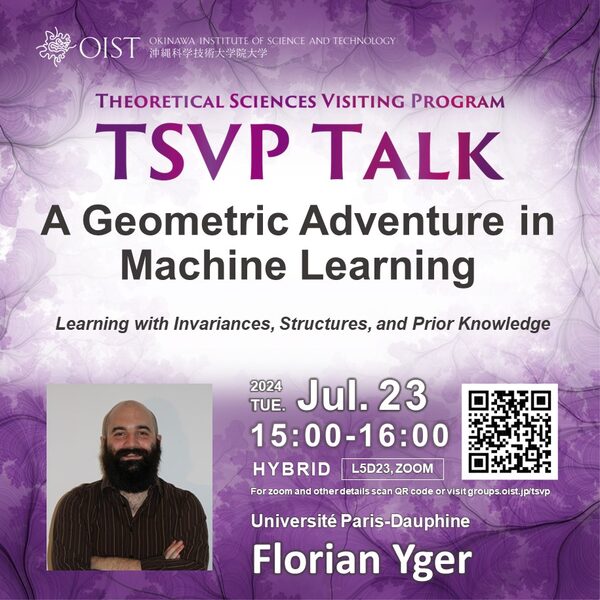TSVP Talk: "A Geometric Adventure in Machine Learning: Learning with Invariances, Structures, and Prior Knowledge" by Florian Yger

Description
Title: A Geometric Adventure in Machine Learning: Learning with Invariances, Structures, and Prior Knowledge
Abstract: In this presentation, we embark on a journey through the landscapes of machine learning, focusing on the role of representation learning. Traditional approaches often restrict themselves to Euclidean spaces, yet many real-world data, such as graphs and covariances, defy this simplistic framework. We explore how embracing non-Euclidean geometries—specifically curved spaces like Riemannian manifolds—unlocks new possibilities in understanding and predicting structured data. This framework allows for the incorporation of prior knowledge such as constraints and invariances into machine learning algorithms.
Central to our exploration is the Fréchet averaging problem, a fundamental tool that generalizes the well-know average to metric spaces. From this cornerstone, we derive many extensions ranging from graph averaging to dimensionality reduction on Riemannian manifolds. We illustrate their practical implications through numerical experiments on biomedical data.
Motivated by challenging applications, this presentation not only highlights the limitations of Euclidean-centric approaches but also underscores the potential of geometry-aware representation learning. Join us as we navigate this geometric adventure into the curved realm of geometry-aware representation learning.
Profile: Florian Yger is an associate professor at Université Paris-Dauphine since 2015, teaching Data Analysis and Machine Learning in the department MIDO. Within the LAMSADE, he is part of the team MILES which focuses on trustworthy Machine Learning and Explainable AI. From 2014 to 2015, he was a JSPS postdoctoral fellow in the laboratory of Prof. Sugiyama at Tokyo University. He received his PhD in Computer science from LITIS, Université de Rouen under the supervision of Alain Rakotomamonjy in 2013. He contributes to the problem of representation learning with a particular interest in the representation of structured data (graphs, covariance matrices,…) and the development of learning algorithm for non-Euclidean spaces. This work has many applications ranging from signal processing (EEG signals and Brain Computer Interface) and to image processing (Paintings for art style recognition). More recently, within MILES teams, he addresses the questions of trust, explainability and interpretability in machine learning models with a focus counterfactual reasoning on data. He recently started studying the interplay between computational social choice and machine learning in the context of voter’s opinion aggregation. He is a visiting researcher at RIKEN AIP, Japan since 2017, is a member of the Prairie (PaRis Artificial Intelligence Research InstitutE) where he holds a junior chair, and an Affiliate of the Theoretical Sciences Visiting Program (TSVP) at OIST.
Language: English, no interpretation.
Target audience: General audience / everyone at OIST and beyond.
Freely accessible to all OIST members and guests without registration.
This talk will also be broadcast online via Zoom:
Meeting ID: 940 2087 9735
Passcode: 975412
※ Please note that this event may be recorded and the videos uploaded. In addition, photos may be taken during the event. These are intended for publication online (the OIST website, social media, etc.)※
Add Event to My Calendar
Subscribe to the OIST Calendar
See OIST events in your calendar app





